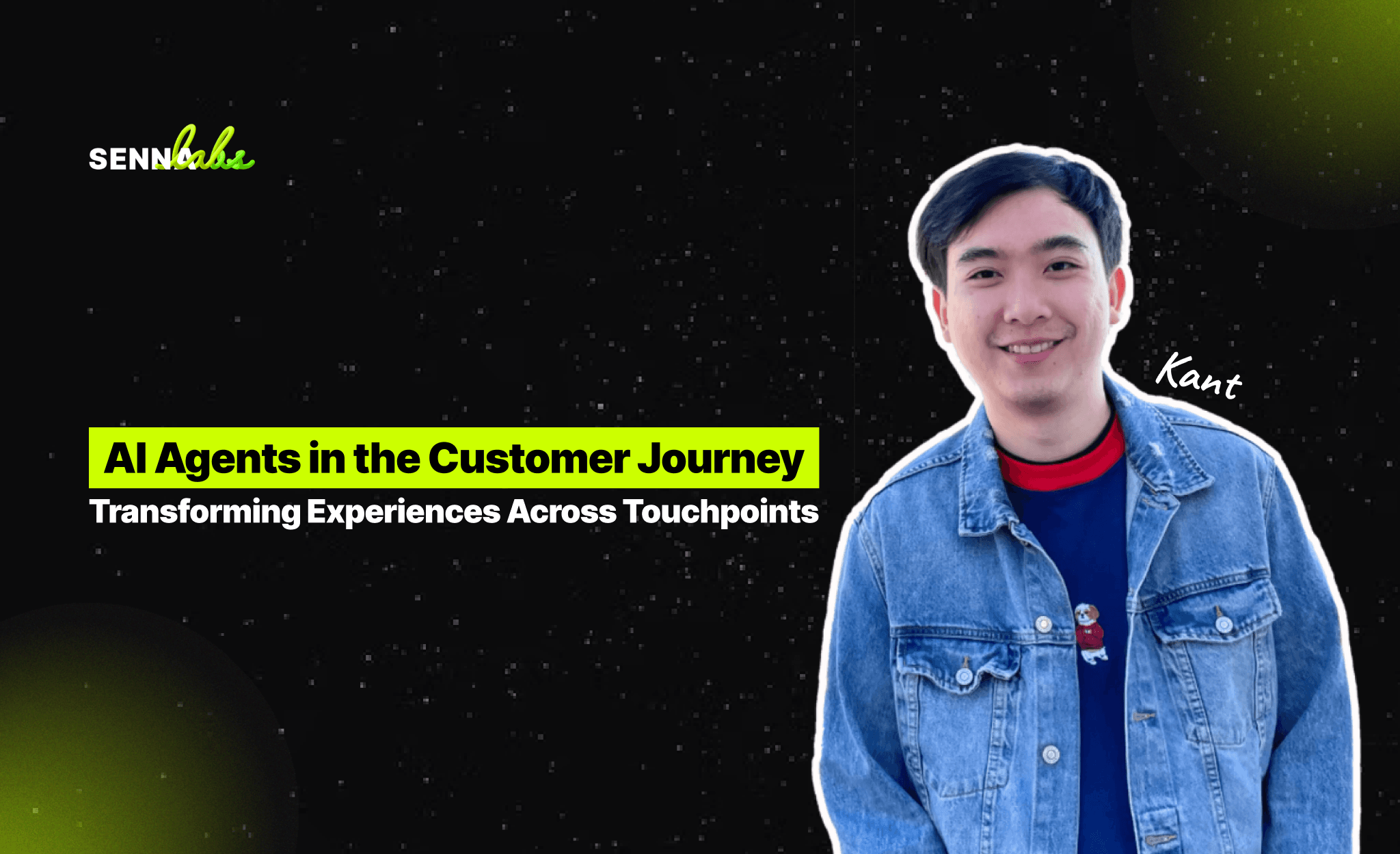AI Agents in the Customer Journey: Transforming Experiences Across Touchpoints
Share

In today’s hyper-competitive marketplace, understanding and optimizing the customer journey has become a cornerstone of successful businesses. The customer journey, which encompasses every interaction a customer has with a brand, is no longer linear or predictable. With the rise of digital platforms, mobile technologies, and social media, customers now expect seamless, personalized, and intuitive experiences. To meet these heightened expectations, businesses are increasingly turning to artificial intelligence (AI) agents.
AI agents are transforming the customer journey by providing tailored interactions, automating repetitive tasks, and delivering insights that empower businesses to better understand and serve their customers. This article explores the role of AI agents in enhancing the customer journey across various stages, the benefits they bring, and the challenges businesses face in their implementation.

Understanding the Customer Journey
The customer journey typically includes several key stages, often visualized as a funnel or cycle. These stages include:
-
Awareness: The customer becomes aware of a product, service, or brand.
-
Consideration: The customer evaluates options and considers making a purchase.
-
Purchase: The customer decides to buy a product or service.
-
Retention: The customer continues to engage with the brand after the purchase.
-
Advocacy: The customer promotes the brand through word-of-mouth, reviews, or referrals.
Each stage offers opportunities for businesses to engage with customers meaningfully. AI agents, with their ability to process vast amounts of data and interact intelligently, play a pivotal role in enhancing these interactions.
The Role of AI Agents in the Customer Journey
AI agents use machine learning, natural language processing (NLP), and predictive analytics to optimize customer interactions. Their impact is felt across every stage of the customer journey:
1. Awareness: Identifying and Attracting Potential Customers
AI agents enhance brand visibility and attract potential customers by delivering targeted and relevant content. By analyzing data from search engines, social media, and browsing behavior, AI systems identify patterns that reveal customer preferences.
-
Personalized Advertising: AI tailors advertisements to individual preferences, ensuring potential customers see ads that resonate with their interests.
-
Search Engine Optimization (SEO): AI analyzes search trends and optimizes content to improve visibility and reach.
-
Social Media Engagement: AI-driven tools schedule posts, respond to comments, and analyze audience sentiment, fostering meaningful engagement with potential customers.
2. Consideration: Engaging and Educating Customers
During the consideration phase, customers evaluate options and seek information. AI agents provide the personalized support and insights they need to make informed decisions.
-
Chatbots: AI-powered chatbots engage with potential customers in real-time, answering questions, providing product recommendations, and addressing concerns.
-
Content Recommendations: AI systems suggest blogs, videos, or guides tailored to the customer’s interests, deepening their understanding of the product or service.
-
Competitor Analysis: AI tools help businesses understand their competitors’ strategies, allowing them to position their offerings effectively.
3. Purchase: Streamlining Transactions
AI agents simplify the purchasing process by creating seamless and intuitive experiences that reduce friction.
-
Dynamic Pricing: AI analyzes market trends and customer behavior to optimize pricing strategies, offering competitive yet profitable prices.
-
Predictive Recommendations: AI suggests complementary or additional products, increasing the average order value.
-
Automated Checkout: AI streamlines checkout processes, reducing cart abandonment rates by simplifying steps and offering preferred payment methods.
4. Retention: Building Long-Term Relationships
After the purchase, AI agents help businesses retain customers by delivering exceptional post-sale experiences and personalized interactions.
-
Customer Support: AI-powered virtual assistants provide 24/7 support, handling common queries and escalating complex issues to human agents when needed.
-
Personalized Offers: AI analyzes purchase history and preferences to deliver tailored discounts, loyalty rewards, or exclusive deals.
-
Feedback Collection: AI tools gather and analyze customer feedback, identifying pain points and areas for improvement.
5. Advocacy: Turning Customers into Promoters
AI agents foster customer advocacy by ensuring that customers feel valued and heard.
-
Social Listening: AI monitors social media platforms for mentions of the brand, identifying opportunities to engage with happy customers or address negative experiences.
-
Automated Review Requests: AI systems encourage satisfied customers to leave positive reviews or testimonials, enhancing the brand’s reputation.
-
Referral Programs: AI optimizes referral campaigns, identifying the most effective incentives to turn loyal customers into brand advocates.
Benefits of AI Agents in the Customer Journey
-
Personalization at Scale:
AI agents deliver tailored experiences to millions of customers simultaneously, ensuring each interaction feels personal and relevant. -
Enhanced Efficiency:
By automating routine tasks like answering FAQs or scheduling emails, AI frees up human agents to focus on high-value interactions. -
Real-Time Insights:
AI analyzes customer behavior in real-time, enabling businesses to respond quickly to changing needs and preferences. -
Increased Customer Satisfaction:
AI agents provide instant support and personalized recommendations, improving overall customer satisfaction. -
Cost Savings:
Automating processes like customer service and marketing reduces operational costs while maintaining high levels of service. - Improved Decision-Making:
AI-driven analytics empower businesses with actionable insights, helping them make data-informed decisions.
Challenges in Implementing AI Agents in the Customer Journey
Despite their benefits, implementing AI agents comes with challenges that businesses must address:
-
Data Privacy and Security:
Collecting and analyzing customer data raises concerns about privacy and compliance with regulations like GDPR or CCPA. -
Integration Complexity:
AI systems must integrate seamlessly with existing tools and platforms, which can be technically demanding. -
Bias in Algorithms:
Poorly trained AI models may produce biased results, affecting the fairness and inclusivity of customer interactions. -
Customer Trust:
Over-reliance on AI can sometimes feel impersonal. Businesses must strike a balance between automation and human touch to build trust. -
Cost of Implementation:
Developing and deploying AI systems requires significant investment, which may be a barrier for smaller businesses.
Best Practices for Implementing AI Agents
To maximize the potential of AI agents in the customer journey, businesses should follow these best practices:
-
Start Small:
Begin with a specific use case, such as chatbots for customer service, and expand gradually as the system proves effective. -
Prioritize Data Security:
Implement robust security measures and transparent data policies to protect customer information. -
Blend AI with Human Support:
Use AI to handle routine tasks while reserving complex or sensitive interactions for human agents. -
Regularly Update Algorithms:
Continuously train AI models with diverse and updated data to ensure accuracy and relevance. -
Monitor Performance:
Track key metrics, such as customer satisfaction and conversion rates, to evaluate the effectiveness of AI systems. -
Educate Customers and Staff:
Provide clear explanations about how AI is used and train employees to leverage AI tools effectively.
The Future of AI in the Customer Journey
The role of AI in the customer journey is expected to grow as technology advances. Emerging trends include:
-
Hyper-Personalization: AI systems will analyze even more granular data to deliver ultra-specific recommendations and experiences.
-
Voice AI: Voice assistants will play a larger role in customer interactions, enabling hands-free engagement across touchpoints.
-
Predictive Analytics: AI will anticipate customer needs before they arise, allowing businesses to offer proactive solutions.
-
Immersive Experiences: Integration with augmented reality (AR) and virtual reality (VR) will create more engaging and interactive customer experiences.
Conclusion
AI agents are transforming the customer journey by delivering personalized, efficient, and engaging experiences at every stage. From attracting new customers to building long-term loyalty, AI-powered tools empower businesses to meet and exceed customer expectations. While challenges exist, thoughtful implementation and adherence to best practices can help businesses unlock the full potential of AI, paving the way for a future where the customer journey is more seamless, intuitive, and impactful than ever before.

Share

Keep me postedto follow product news, latest in technology, solutions, and updates
Related articles
Explore all


